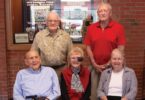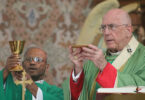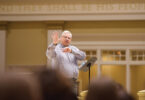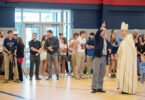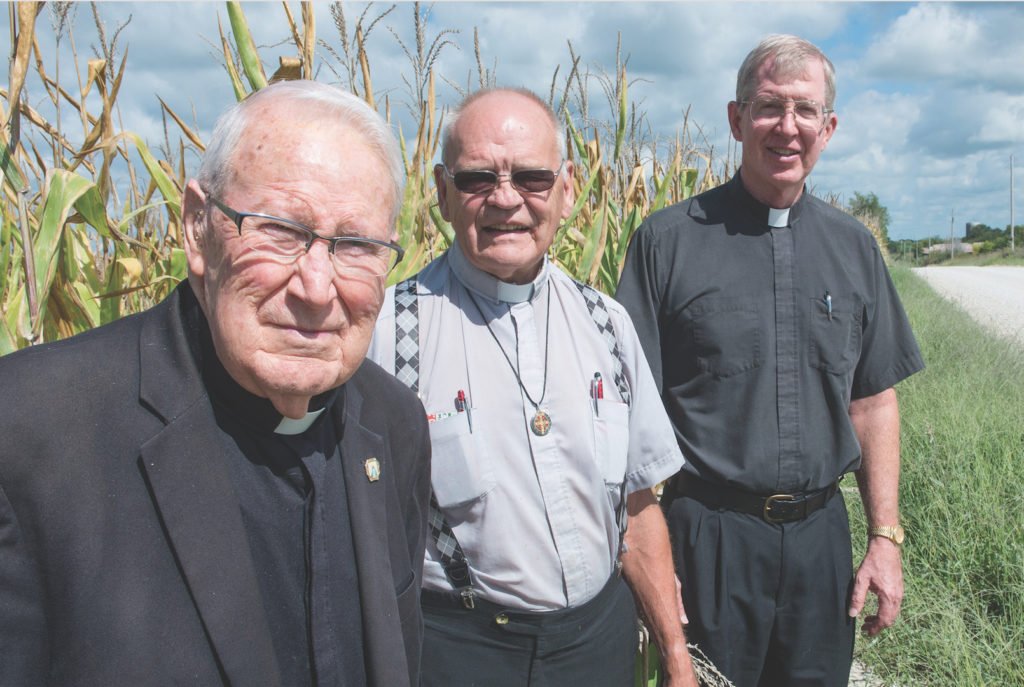
From left, Fathers Carl Dekat, Earl Dekat and Mike Peterson serve the rural communities of Alma, Wamego, Flush and Paxico. The retired Dekat cousins help Father Peterson keep up with his four parishes. LEAVEN PHOTO BY JOE BOLLIG
by Moira Cullings
moira.cullings@theleaven.org
WAMEGO — Life in a small-town parish moves at its own pace.
From the population to the prayer intentions, rural parishes are noticeably different from those in the city.
But country living has grown up and, if you look a little closer, there are similarities that connect the areas in ways one might not expect.
Fathers Ray May, Mike Peterson and Earl and Carl Dekat know this as well as anyone.
Small-town roots
Father Peterson is pastor of St. Joseph Parish in Flush, Sacred Heart Parish in Paxico, Holy Family Parish in Alma and St. Bernard Parish in Wamego.
Growing up in the small town of Clyde prepared him for serving in rural parishes.
“It was a town of about 900 when I grew up,” said Father Peterson. “Wamego’s a big town compared to what I grew up in.”
Father Peterson’s uncles were farmers, so he would help them in the summer with their harvest.
“I can talk a little ‘Farmese,’” he admitted with a grin.
Although Father Peterson was only ordained in 2011, he’s already had a taste of suburban and rural parishes, serving his first assignment at St. Michael the Archangel in Leawood.
“St. Michael’s is one of those over-2,000 family [parishes],” he said. “So it’s hard to remember names.
“I can at least start remembering names here.”
But even with smaller parish populations, serving four of them at once can get complicated.
Fortunately, Father Peterson has help from the Dekat cousins, retired priests who take turns saying Masses and taking on other tasks to lighten Father Peterson’s load.
Father Carl and Father Earl were raised on farms in Flush where they currently reside.
Both are passionate about country living.
“I was raised on a family farm,” said Father Carl. “We farmed horses back in my day.”
Father Earl has served in Kansas City, Kansas, Topeka, Leavenworth and a variety of rural parishes throughout the archdiocese.
“There’s probably no one in this diocese who has served as many parishes as I have — and all these rural parishes,” he said.
But he and Father Carl prefer it that way.
“I’d rather be out in the country than in the city,” said Father Carl.
Fourteen miles east of Wamego, Father May serves as pastor of Immaculate Conception Parish in St. Marys and St. Stanislaus Parish in Rossville.
Father May grew up in Topeka, Aurora and Oswego (both in Illinois), which all had more of a big-city vibe compared to the rural parishes he serves now.
“It’s a slower pace [out here],” said Father May. “You can walk to where you want to go, get to know people and be recognized better.”
Father May has experience with college campus ministry and Hispanic ministry, as well as a variety of rural parishes.
“You get to know people more out here,” he said.
“St. Mary’s in Hartford [where I served before] has 50 families, so you get to know pretty much everybody.”
Country qualities
Every parish has its own personality, and rural ones are no exception.
“People are more concerned about rain here,” said Father May.
“We’re always praying for rain or higher commodity prices,” said Father Peterson.
If they had to describe their parishioners, Father Earl would say “eager to learn,” Father Peterson would say “lively” and Father May would say “rooted, faith-filled and family-oriented.”
All four priests have noticed their parishioners’ lifestyles tend to be similar to those in suburban areas, but with a twist.
“There’s a farm influence on all of the parishes,” said Father Peterson.
But these days, most rural residents work normal jobs and farm on the side — unlike the full-time farmers of years ago.
“They own some land that they farm or raise livestock on and, at the same time, have another job,” said Father May.
Much of that has to do with the bigger towns surrounding the priests’ rural parishes — namely Manhattan and Topeka.
“People live out in the country and like to be away from the big city of Manhattan, and they’ll commute into there,” said Father Peterson.
“We’re kind of a bedroom community for Manhattan,” he added.
St. Bernard Parish has become more like a city than Father Peterson’s other parishes, he said.
“We have quite a variety of demographics — from a lot of kids to older people,” he said. “They’re well-educated.”
The parish boasts four college professors from Kansas State University, as well as employees of Caterpillar Inc.
The priests have also noticed a greater youthful impact on the country parishes.
“There are lots of young people,” said Father Earl. “And I think that’s characteristic more of the rural areas than the city areas.
“They seem to participate more in the life of the church [here].”
Rural retirement
For Father Carl and Father Earl, retirement in the country comes with its own set of responsibilities.
“I say daily Mass and help out on weekends,” said Father Earl.
“I’m chaplain [of the] Knights of Columbus in Flush,” he added.
Father Carl also continues to say daily and Sunday Masses when needed, and visits parishioners.
“I’ve always enjoyed taking Communion out,” he said.
Father Peterson appreciates any relief they can offer.
“I try not to overwork them,” he said. “I try to accommodate their being retired.”
“Sundays is where I need the help,” Father Peterson continued. “I can’t be in two places at once.”
One of the keys to success with multiple parishes is communication with the parish secretaries.
Without their help, the priests agreed, things would get chaotic.
And although the retired priests work hard, they still enjoy their free time, with Father Earl spending much of his gardening on his property in Flush.
“I spend a lot of time hoeing weeds,” he said. “I have 40 tomato plants, okra, cucumbers.”
He also takes advantage of small-town perks like fishing in the creek that runs through his own backyard.
Ups and downs
Serving in the country comes with unique challenges and its own set of advantages.
“I think there’s more activity in those big Johnson County parishes,” said Father May.
“They have more talent to draw from for things,” he continued. “Here, we struggle sometimes to get accompanists and cantors.”
Having fewer resources is a challenge many rural priests face.
“There have been a few Saturday evening Masses where we haven’t found anyone to come forward [and sing], so I end up being my own cantor,” said Father May.
“But if you have people of faith in your parish, you can usually find [the help],” he added.
For rural priests, email and phone communication is important when questions about liturgy or other problems arise, since the archdiocesan offices are so far away.
“It’s a little more challenging to find an answer,” said Father Peterson.
“You rely upon your own judgment more,” he added.
But a definite bonus of serving in the country is the food.
“In all these rural parishes, you’ll never find a bad meal,” said Father Earl. “In every place I’ve been, the rural people know how to cook.”
Serving in small towns has also brought the priests closer to their parishioners and to creation.
“You feel like you’re more part of the family,” said Father Earl.
“You see more of nature, too,” said Father Peterson, “and a variety in the seasons.”
“[You see] a beautiful sunrise over the Flint Hills,” he continued. “You see aspects of nature in a different perspective.”
Although the days can go by slowly, it’s hard to get bored, said Father May.
“In our time, everything is so accessible,” he said. “And there’s interesting things about any area you go.”
For priests who will serve country parishes in the future, it doesn’t matter where they’re coming from, said Father May.
His advice for them would be the same.
“You have to be adaptable,” he said, “and be willing to listen to people.
“Get out of the way and let people do what they’re good at.”

